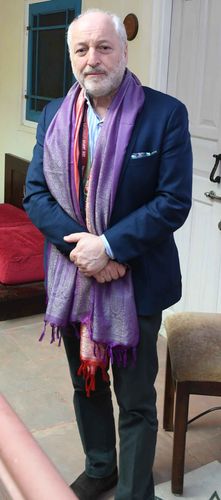American writer Andre Aciman, 68, first felt desire when he was eight or nine years old. It was for a youth of 17 or 18, who used to hang out on the beach near his home. “I did not know him, and he did not know me,” says Aciman. “But I wanted him to be my friend. I also knew that there was something wrong in wanting him so badly.” It is that desire—fierce and obsessive—that he translated into his book, Call Me By Your Name. It is about the summer romance of two youth, Elio and Oliver, set in Italy in the 1980s.
The book, published in 2005, won the Lambda literary award for gay fiction. It was made into a film in 2017 by Luca Guadagnino, starring Timothee Chalamet and Armie Hammer. It got four Oscar nominations and won the one for best adapted screenplay.
Elio, 17, is a cerebral Jewish kid who resents the young academics his father, a professor, takes in during summer to help them revise their manuscripts. When the latest houseguest, Oliver, steps out of the cab in his “billowy blue shirt, wide-open collar, sunglasses, straw hat, skin everywhere”, Elio thinks that he could grow to like him, from his “rounded chin to rounded heel”.
But then, within days, the ‘like’ blooms into an intense desire for the older youth. The two start playing a cat-and-mouse game of chase, one moment enticing one another with longing glances and small intimacies, and in the next, denying the chemistry and ignoring the other. Ultimately, the game culminates in an explosive and unquenchable passion, a love that a reviewer described as “exquisite suffering”.
The book is really a meditation on passion, and the story is only the background track that holds all the chords together. Passion is such an elusive emotion for a writer—how do you really put it into words?—that Aciman’s real triumph is capturing it with all the nuances. Anyone who has ever felt the ache of first love will be able to attest to the truth of what he writes.
The faint echo of Aciman’s own life resounds throughout the book, and many experiences of Elio and Oliver resemble the writer’s own. For example, there is a scene in which the two youth passionately kiss against a wall, which was inspired by such a kiss that Aciman shared with a woman when he was 28. “Whenever I go back to that wall, years later, it is as if she is still there and I am still there, so there is something holy about it,” says Aciman, “as if some energy has transpired from us and has lodged itself in that corner of the wall. I wanted to capture that moment [in the book].”
Call Me By Your Name concludes many years after the romance fizzles out, when Oliver informs Elio that he is getting married. When, for the last time, he visits Elio at the summer house, Elio wishes he would, as he had done when they were together, “look me in the face, hold my gaze, and call me by your name”. It is a poignant ending, which evokes the unfinished nature of a love that is, perhaps, destined to never end. In fact, it seems like a metaphor for the writer’s own endless fascination with the story.
Last month, Aciman announced that a sequel to Call Me By Your Name—Find Me—will be published by Farrar, Straus and Giroux in October. “Clearly,” he told me, “I am writing about this because I have not yet resolved the issue. It is about desiring somebody obsessively, and yet not knowing how to actualise that desire.” Unfulfilled desire is one of the most painful feelings in the world. Perhaps, both Aciman and Elio will find closure with this sequel.


